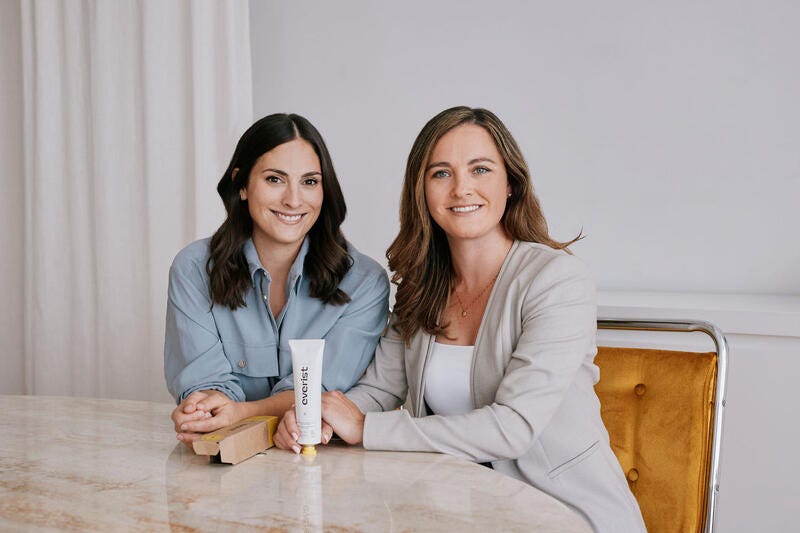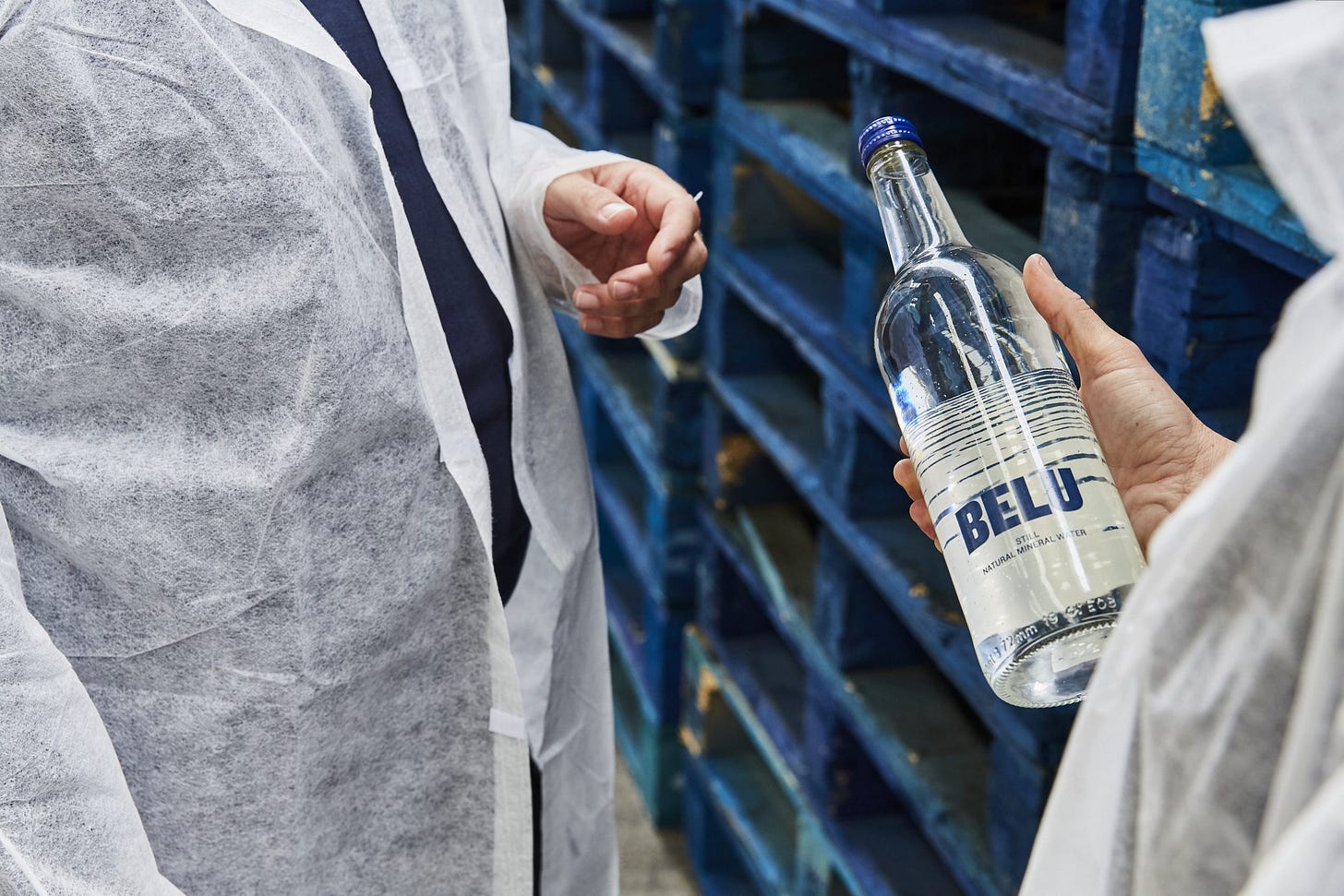🌱 Your Extended Producer Responsibility (EPR) refresh, and why Everist are concentrating on waterless products.
Featuring Planet A Foods, PANGAIA, innocent, BELU and more...
Happy Monday!
This week we cover:
Quick Take: 2023's FMCG Legal Pipeline Part 5: EPR Updates
Brand Spotlight: Concentrating on their impact: Why Everist are creating waterless products.
In case you missed it: 🌱 Invest in resilience: How Belu are putting purpose in their P&L, and you can follow suit with Creating Nature's Corridors.
> Good News Last Week
🎯 Planet A Foods has partnered with Peter Kölln GmbH & Co. KGaA and Griesson - de Beukelaer GmbH & Co. KG to release their cocoa-free chocolate to retailers. The chocolate, made from fermented oats and sunflower seeds, will feature in products such as mueslis and cookies in Rewe stores.
⭐️ PANGAIA announced the launch of their resale program in partnership with Archive, which aims to target garment waste. The platform, ReWear, will work as a digital passport for peer-to-peer resale. The platform plans to incorporate rental services, repair programs, aftercare solutions and take-back schemes.
⭐️ Innocent drinks produced 250 pairs of sneakers from their juice by-product waste. Teaming up with German sneaker company VLACE, they used apple pomace to make vegan leather, which was then turned into shoes.
⭐️ Abel & Cole announced they’ve saved over 269 tonnes of food waste so far this year. Any food that cannot be sold goes to their charity partners or back to their suppliers for animal feed.
⭐️ Just Eat launched the next phase of their restaurant carbon labelling trial with My Emissions. Teaming up with 12 London-based restaurants, they’re raising awareness about the carbon impact of food in the workplace by targeting corporate companies through Just Eat for Business.
⭐️ Tesco announced the expansion of their green fertiliser trial, which uses fertiliser alternatives like food waste, fire extinguishing powder, algae and chicken litter to grow produce. They are currently working with suppliers to expand the range of chemical alternatives, with plans to implement this strategy with their farmers.
> Click on each link to read more.
> Quick Take
2023's FMCG Legal Pipeline Part 5: EPR Updates
It’s been a whirlwind of a summer in the FMCG environmental legal world - from the Scotland DRS being delayed, to the scrapping of mandatory food waste reporting and the future of a potential approach to recycling. And whilst it doesn’t look likely to stop anytime soon, ensuring that brands and businesses of all sizes are ready is top of the priority list. So, to keep us on track, we’re back with our latest legal update.
This newsletter focuses on the updates to the Extended Producer Responsibility (EPR) scheme, and what it means for UK businesses now. It’s a bit wild to think that it was almost one year ago to the date that we gave our first update on this regulation - you can read what we expected from this regulation way back then here - but big caveat that it would appear that a lot has changed over the last 12 months.
Quick recap, what is EPR?
Under the Organisation for Economic Co-operation and Development’s definition, Extended Producer Responsibility (EPR) is an approach in which a producer’s responsibility for a product is extended to the post-consumer stage of a product’s life cycle. While other policies target a single point in the chain, EPR aims to cover the full value chain, incentivising environmentally beneficial characteristics of both finished goods and production processes.
Is EPR a new approach to recycling?
In the UK, yes (more on this soon) but generally speaking, not really. France has been operating an EPR scheme for over 20 years, countries like Belgium, Canada and Japan have e-waste EPR schemes in operation and Slovakia has been doing similar since the 2010s.
But in the UK, EPR for all packaging is most definitely a new, and needed, approach. But it’s not without its challenges - and businesses are going to feel the pinch the most.
So who is going to be affected?
EPR will apply to UK businesses that meet all of the following criteria:
You are an individual business, subsidiary or charity;
You have an annual turnover of £1 million or more
You were responsible for more than 25 tonnes of packaging in 2022
You carry out any of the packaging activities.
And if you meet the above criteria, you will have to collect packaging data, pay waste management fees, pay costs to scheme administrators and environmental regulators, purchase PRNs (packaging recycling notes) as well as report volumes of packaging supplied or imported into the UK.
In short, it's no small task for businesses, of all sizes.
And what's the most recent update?
The most recent updates (September 2023) to the EPR regulations announced that the fees associated with the regulation have been deferred for a year, starting in October 2025 and that no enforcement action will be taken. These fees will also vary depending on the material you report, and the ease of packaging recyclability, though these costs have not yet been released. However, businesses must still report packaging data for 2023.
How will this affect businesses & what are the next steps?
This is a welcome financial relief for UK businesses, though the challenge of data gathering and reporting is still a top priority. To ensure compliance, businesses should do the following as a starting point:
Submit your organisations details and your packaging data (bi-annually for large businesses - October is the first deadline!) directly or via a compliance scheme.
We know this world can be complex, intimidating and downright confusing. Here at FTF we will strive to keep you in the loop. If you have questions, or topics you’d like to see us cover next, let us know!
> Brand Spotlight
Concentrating on their impact: Why Everist are creating waterless products.
How many times has the airport security taken your shampoo from you? With Everist, never again. Founded by two women in Ontario, Canada, Everist’s products are compact (reduces shipping emissions) and carbon neutral, with clean and biodegradable ingredients.
The co-founders, Jayme and Jessica, met in undergrad and stayed in touch throughout their journeys in the beauty and consumer goods industry, where they worked at companies including Revlon, L’Oreal, Procter & Gamble, and The Body Shop. Through these experiences, the two were awoken to a serious plastic problem in the industry. They knew that if they were to build something together, they had to prioritise sustainability and quality.
Why waterless shampoo?
The pair asked themselves two key questions that contributed to their final idea:
Most shampoos are 70% water! Why are we shipping large, heavy beauty products full of water around the world?
Why do we need water in haircare when we’re already showering in water?
Out of this exploration came waterless hair products. The extra-concentrated products that Everist sells, including a shampoo, a conditioner, and a body wash, are jam-packed with top-tier ingredients. Their approach has brought many awards including ELLE’s “Green Beauty Stars Award,” Popsugar’s “Conscious Beauty Award,” and one of Vogue Magazine’s “Best New Sustainable Beauty Products”.
Working in collaboration to measure their impact
Certified carbon neutral, they use Bluebird Climate’s technology to assess their carbon impact and produce live impact reports. For example, Bluebird tells Everist and their consumers that 59% of the emissions from their shampoo come from their formula, while only 10% come from the supply chain design. They also know that Everist Concentrates have a 77% smaller carbon impact and a 62% smaller waste impact than traditional water-filled shower products, which are packaged in plastic bottles.

Everist also purchases verified carbon credits from SeaTrees that contribute to projects that have both environmental and social benefits. On top of this, they’re Climate Neutral Certified, are a 1% for the Planet member, and support Plastic Bank. To decrease their initial carbon footprint, the majority of Everist’s suppliers are within a 70-mile radius.
Everist has also transformed the usual 3 Rs of waste management into 6Rs:
Reject: They reject single use plastics and petroleum-derived ingredients.
Reduce: Everist products require less packaging (they’re 1/3rd the size of traditional shampoo) and less carbon to ship.
Reuse: 100% recycled aluminium tubes and 100% recycled kraft paper boxes, to give two examples.
Recycle: Most packaging is fully recyclable, alongside their choice of aluminium tubes.
Repurpose: Their CapBack programme covers postage costs of sending back their small plastic caps.
Revisit: They check-in on their progress quarterly, and as part of their Climate Neutral Certification.
Concentrating on community
For Jayme and Jessica, this venture is bigger than haircare. They hope to make a sustainable transition easier for people, while also reminding consumers that it’s okay to make mistakes along the process. Their community refer to themselves as “imperfect environmentalists and eco-optimists.” On their website, Everist touts that “real ‘zero-waste' doesn't exist, but that doesn't stop us from trying.” A key part of their brand is the ‘Eco-Optimist Club’, a subscription program that offers deals, early access, and free gifts from partnering sustainable brands.
The meaning behind the name Everist is something we should all keep in mind in this industry. It refers to the customer being an ‘ever-ist’, and considering their forever impact when they make a purchase. How can you encourage your consumers to do the same?
Take a closer look at Everist:

> In case you missed it
🌱 Invest in resilience: How Belu are putting purpose in their P&L, and you can follow suit with Creating Nature's Corridors.
Featuring BELU, Eden Brew, Plant-It and more...
> Follow up with…
Article: The water footprint: how to safeguard the most precious resource
Webinar: Natural Carbon Sequestration Explored: Inside the UK Woodland Carbon Code
👉 Pssst - want to be featured in our ‘Meet the Partners’ series? Reach out here!



